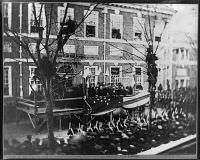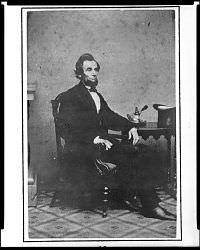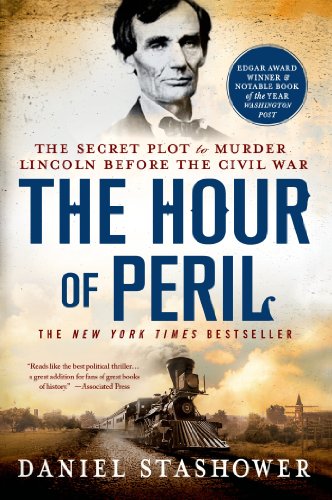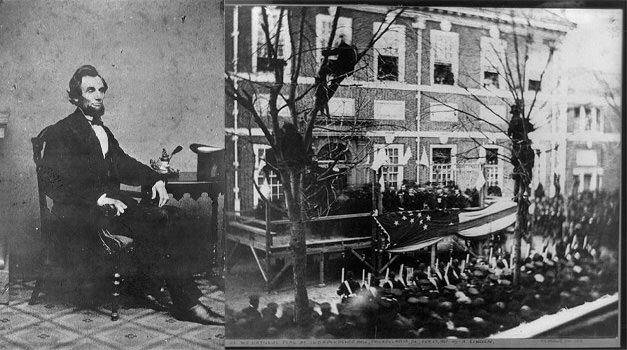The Hour of Peril by Daniel Stashower
What's It About?
On the eve of the Civil War in 1861, Abraham Lincoln ignored a looming threat against his life and gave an emotionally charged speech in honor of George Washington’s birthday.by Daniel Stashower
On the eve of the Civil War in 1861, Abraham Lincoln ignored a looming threat against his life and gave an emotionally charged speech in honor of George Washington’s birthday.
“All imagination,” Abraham Lincoln was reported to say when confronted with threats against his life. “What does anyone want to harm me for?”
 But on the morning of February 22, 1861, as the newly-elected President raised a flag over Independence Hall in Philadelphia to honor George Washington’s birthday, he could not afford to be so cavalier. For thirteen days, as Lincoln traveled by train from Springfield to Washington for his inauguration, the air bristled with talk of an assassination plot. In Maryland, where his train would dip below the Mason-Dixon line for the first time, there were rumors that he would be shot—or stabbed, or perhaps even blown up—at a whistle-stop appearance in Baltimore.
But on the morning of February 22, 1861, as the newly-elected President raised a flag over Independence Hall in Philadelphia to honor George Washington’s birthday, he could not afford to be so cavalier. For thirteen days, as Lincoln traveled by train from Springfield to Washington for his inauguration, the air bristled with talk of an assassination plot. In Maryland, where his train would dip below the Mason-Dixon line for the first time, there were rumors that he would be shot—or stabbed, or perhaps even blown up—at a whistle-stop appearance in Baltimore.
The previous evening at Philadelphia’s Continental Hotel, Lincoln sat in grim silence as detective Allan Pinkerton presented him with evidence that an assassination attempt would be made in Baltimore by a group of conspirators “ready and willing to die to rid their country of a tyrant, as they considered Lincoln to be.” In Pinkerton’s view, the only way of insuring the President-elect’s safety would be to abandon his well-publicized itinerary and head straight for Washington ahead of schedule. The surprise maneuver, Pinkerton hoped, would catch the plotters off guard. By the time they took their places for the scheduled arrival of Lincoln’s train, Lincoln himself would be safe in Washington. It had become an “absolute necessity,” the detective insisted, to proceed directly to Washington that very night, under Pinkerton’s personal protection.
 Lincoln flatly refused. “I have promised to raise the flag over Independence Hall tomorrow morning,” he declared, offering instead to put himself in Pinkerton’s hands the following evening, once his official obligations were fulfilled. “The firmness of tone in which Mr. Lincoln spoke showed that there was no further use in arguing the proposition,” a dejected Pinkerton wrote in his field report.
Lincoln flatly refused. “I have promised to raise the flag over Independence Hall tomorrow morning,” he declared, offering instead to put himself in Pinkerton’s hands the following evening, once his official obligations were fulfilled. “The firmness of tone in which Mr. Lincoln spoke showed that there was no further use in arguing the proposition,” a dejected Pinkerton wrote in his field report.
Lincoln’s refusal to abandon the final hours of his official itinerary is easily understood. He had travelled many miles out of his way to mark George Washington’s birthday within the “consecrated walls” of Independence Hall. Seen in the light of Pinkerton’s urgent warning, however, Lincoln’s speech that morning carried an extra resonance, though few were aware of it at the time. Head uncovered, the President-elect stood in the chamber where the Declaration of Independence was signed and drew a pointed, timely lesson from the pages of history:
I am filled with deep emotion at finding myself standing here, in this place, where were collected together the wisdom, the patriotism, the devotion to principle, from which sprang the institutions under which we live . . . I have never had a feeling politically that did not spring from the sentiments embodied in the Declaration of Independence. I have often pondered over the dangers which were incurred by the men who assembled here, and framed and adopted that Declaration of Independence. I have pondered over the toils that were endured by the officers and soldiers of the army who achieved that Independence. I have often inquired of myself, what great principle or idea it was that kept this Confederacy so long together. It was not the mere matter of the separation of the Colonies from the motherland, but that sentiment in the Declaration of Independence which gave liberty, not alone to the people of this country, but, I hope, to the world, for all future time. It was that which gave promise that in due time the weight would be lifted from the shoulders of all men. This is a sentiment embodied in the Declaration of Independence. Now, my friends, can this country be saved upon that basis? If it can, I will consider myself one of the happiest men in the world, if I can help to save it. If it cannot be saved upon that principle, it will be truly awful. But if this country cannot be saved without giving up that principle . . .
Lincoln paused here for a long moment, his head bowed before tall portraits of Jefferson, Adams and Madison. When he spoke again, having apparently struggled to find the proper words, his voice was firm and clear:
I was about to say I would rather be assassinated on this spot than surrender it.
 Moments later, on a wooden platform outside the hall, Lincoln gazed down on the vast cheering crowd that had gathered for the flag-raising. “They had come, many of them, from a distance,” reported The New YorkTimes, “that they might witness the performance of a deed, the solemn beauty of which cannot well be overestimated.” Stepping forward, Lincoln “threw off his overcoat in an offhand, easy manner” and took hold of the halyards. Pulling hand over hand, he ran the oversized American flag up the pole and watched as it unfurled overhead. The air filled with patriotic music as a line of soldiers fired off a crisp salute.
Moments later, on a wooden platform outside the hall, Lincoln gazed down on the vast cheering crowd that had gathered for the flag-raising. “They had come, many of them, from a distance,” reported The New YorkTimes, “that they might witness the performance of a deed, the solemn beauty of which cannot well be overestimated.” Stepping forward, Lincoln “threw off his overcoat in an offhand, easy manner” and took hold of the halyards. Pulling hand over hand, he ran the oversized American flag up the pole and watched as it unfurled overhead. The air filled with patriotic music as a line of soldiers fired off a crisp salute.
Lincoln’s expression, according to more than one observer, was serene.
Buy this Book!
Amazon




